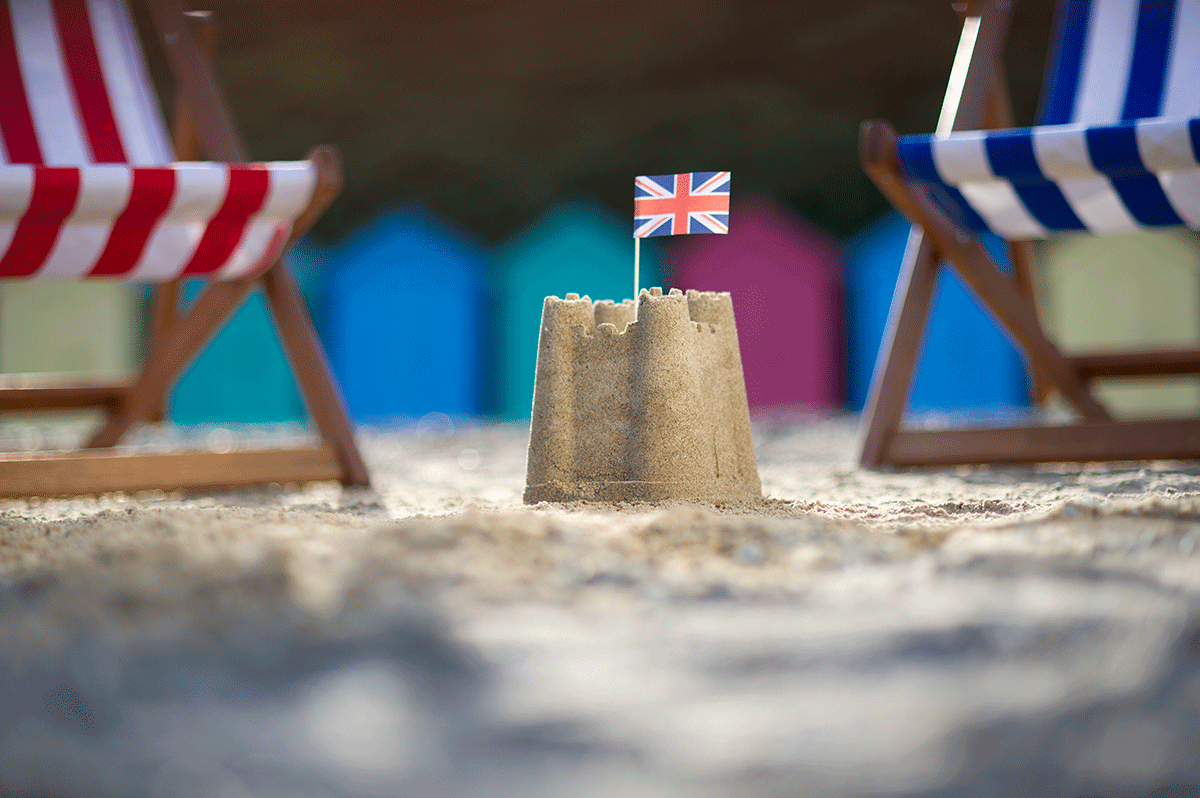The great British staycation: 10 tips for UK holidays on a budget
The way we go on holiday has changed significantly because of the coronavirus. But if you are staying i…
17th July 2020 15:05
by Rebecca Goodman from interactive investor
The way we go on holiday has changed significantly because of the coronavirus. But if you are staying in the UK you can still have a great time without spending a fortune

1 Stay in university halls when students are away
Lots of universities rent out empty dorm rooms for knock-down prices out of term time and they are often in city centre locations. Most rooms have en-suite bathrooms and you can choose singles or doubles. The website University Rooms (universityrooms.com/en-GB/) lists available places.
We found a four-night stay in Oxford for two adults and two children for £400, a stay in York for £110, and a £120 stay in Leeds in August.
2 Kids’ clubs do not have to break the bank
There is a huge range of kids’ clubs and activities available, from summer camps for school-age kids to toddler groups for younger ones.
Working parents may rely on them for childcare but a themed camp (such as football, arts and crafts or theatre skills) could provide all parents with some respite and give the kids a welcome change of scene.
Most local councils will provide free (or very cheap) activities to keep your little ones entertained.
Libraries also have a range of free classes including story time and group activities; garden centres often have free activities – while your local authority should also have a list of everything available in the summer holidays
3 Cheap and free days out

There is a wealth of countryside to explore with free walking trails listed on Walking Britain (walkingbritain.co.uk).
Claire Hall, 40, founder of the UK travel blog Tinboxtraveller (tinboxtraveller.co.uk), says her favourite days out with her husband Allan, 38, and kids Mary, 7, and Drew, 5, are country walks.
“You can download wildlife spotter sheets for free from The Wildlife Trusts and National Trust websites,” she says When it comes to more costly days out, Claire says they keep costs down by scouring discount sites for cheaper tickets and packing their own food.
“One of the biggest expenses of visiting family attractions, beyond parking and entrance fees, is food, which can easily cost £10 a head or more.
“Save money by bringing a packed lunch including a flask of tea or coffee and refillable bottles of water.”
4 Work for your accommodation and meal costs
While it may be more common to do this overseas, there are lots of opportunities in the UK for free holidays in return for a bit of work. The website Workway (workaway.info) lists current vacancies, including a family farm in Snowdonia where you will be required to help with tasks such as walking the dog, cooking and cleaning, in return for free bed and breakfast.
There is also the chance to stay in the Cowal Peninsula of Scotland helping a young couple restore a derelict building, and a home in the north coast of Northern Ireland where you can stay in exchange for helping with gardening, cooking and general DIY jobs.
5 Activity kits and online resources
Since the outbreak of the virus there has been a boom in free (or cheap) online resources to keep children entertained at home.
Lots of organisations have access to free online portals with workshops and activities, including universities such as University College London and museums including The Natural History Museum.
There is also a huge selection of activity boxes you can order. Treasure Trails (treasuretrails.co.uk), for example, has 1,200 trails across the UK, which are downloadable (for £9.99) and encourage families to explore their local neighbourhood with themed challenges.
There is also Toucan Box (toucanbox.com ) where you choose activity packs from arts and crafts to puzzles and quizzes for children, starting at £9.95 per box.
If your kids are Lego fans, you can sign up to the free Lego Life Magazine (lego.com/en-gb/life/magazine) for children aged five to nine, which is packed with games, puzzles and posters.
6 Camping for a week can cost the same as one night in a holiday cottage
Self-catering holidays can appear to be a budget option as you are preparing your own meals, but as Claire Hall says, the costs can add up. Instead she prefers family camping holidays, which she says can cost the same for a week as you would pay for a night in a holiday cottage.
“There are thousands of campsites in the most extraordinary locations around the UK, and if you join a group like the Camping and Caravanning Club, you can get reduced nightly site fees at their campsites,” she explains.
“There are also pre-season sales for larger holiday parks, like Parkdean Holidays and Haven, which have lots of inclusive facilities and activities onsite.”
For the adventurous types, there is also wild camping. This is a great way to explore remote areas of the country without paying campsite fees. It’s only allowed in Scotland, and the Visit Scotland website lists the rules so it’s worth checking it out if you are considering this.
7 Swap your house with another family
Instead of shelling out for a hotel or a self-catering cottage, a home swap is a great way to go on holiday without paying any accommodation costs.
There are lots of websites, including Lovehomeswap.co.uk and Homeexchange.com, which list available properties.
You don’t always have to swap at the same time as another household (see box, right), and the rules of the stay will need to be read and agreed to before it takes place.
These websites won’t provide protection if something goes wrong, such as a house guest breaking something. So it’s worth letting your home insurer know first so that it can tell you what you are covered for and if the stay is allowed within the terms and conditions of your policy.
8 Cash in on loyalty programmes
If you are a Tesco Clubcard holder, you can redeem your points for a host of attractions including days out, travel, and accommodation.
Some newspapers, including The Sun and the Daily Mail, often run cheap holiday vouchers, which are usually valid by collecting tokens and booking UK holiday park breaks, while most hotel chains have loyalty programmes that offer discounts and early access to sales.
Websites such as HotUKdeals (hotukdeals.com) and cashback sites including TopCashback (topcashback.co.uk) can also cut costs: at the time of going to press, for example, there is up to 10% cashback on anything booked at Expedia.
9 Set up camp in your garden
During lockdown families across the country were dusting off their tents and stoves and heading out into the garden for this fun – and free – activity for children of all ages.
There are lots of ideas online for how to camp safely and a huge range of activities for all the family. For example, older children may enjoy the freedom of having an outdoor space to spend time in and helping out with food prep, while younger kids could be challenged with a scavenger hunt around the garden.
10 You may still need travel insurance
As we have the NHS, there is less need to buy travel insurance when holidaying at home. Yet insurance can be helpful in some circumstances, such as if the holiday company you booked with goes bust. Do check the small print, as some insurers stipulate you need to be away for a certain number of days to use their policies.
Brian Brown, spokesperson for Defaqto, adds: “In the current climate it should be remembered that no insurer will cover you for claims arising from Covid-19.
“If you have booked a cottage, say, and the day before you travel one of your party is diagnosed with Covid-19, the insurers won’t pay any cancellation claim.
“Similarly, if you are advised to self-isolate owing to symptoms (for which you have no formal diagnosis), you are very likely to not be covered.”
“We had a free holiday in a beautiful family home”
Alice Deanie, 34, had a free holiday last year with her husband and four children via a house swap. Alice and her husband, David, 35, who together launched Around The Box, a family activity box for all ages, says that the trip saved them around £500 for the five-night stay last August.
“Last July we wanted to get away but as it was the summer holidays and we were on a budget it seemed unlikely,” she says.
“My mum then suggested a Facebook house swap and I put up a post saying we were looking for a swap, and someone got in touch to say that they were going on holiday on the dates we needed.
“We weren’t overly bothered about where we went, just as long as it wasn’t too far from our home in Manchester. A week later we headed to Bradford, which we had never thought about visiting.
“We turned up to find a beautiful family home with toys laid out. We had an absolutely wonderful time visiting an ice cream parlour, the National Science and Media Museum, a canal boat trip, play parks and swimming.
“Even though we didn’t swap our house, we saved a fortune when compared with the cost of renting somewhere for a week.”
This article was originally published in our sister magazine Moneywise, which ceased publication in August 2020.
These articles are provided for information purposes only. Occasionally, an opinion about whether to buy or sell a specific investment may be provided by third parties. The content is not intended to be a personal recommendation to buy or sell any financial instrument or product, or to adopt any investment strategy as it is not provided based on an assessment of your investing knowledge and experience, your financial situation or your investment objectives. The value of your investments, and the income derived from them, may go down as well as up. You may not get back all the money that you invest. The investments referred to in this article may not be suitable for all investors, and if in doubt, an investor should seek advice from a qualified investment adviser.
Full performance can be found on the company or index summary page on the interactive investor website. Simply click on the company's or index name highlighted in the article.